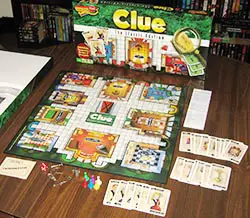
Cross off your cards correctly
This seems obvious, but you would be surprised how many people realize after the game they didn't cross off a card.
Eliminate one possibility every turn
If you can eliminate all false possibilities first, then you have a huge advantage over the other players.
Any turn where you don't make a suggestion is a wasted turn.
Don't ask cards you know your opponents have
After you start by marking off all of your own cards, you want to learn about more cards you can mark off as soon as you can.
If your opponents show you a card that you have already seen, then your it was a wasted turn.
Note: You can suggest your own cards because nobody will be able to disprove them.
Use the secret passages
You can move from a room to another room without having to risk rolling the dice.
The lets you make two suggestions in a row, without having to worry about bad luck when you roll the die.
Make new deductions based on known information
If you know that someone has the revolver card while you have the Mr. Green card and someone else shows a card to disprove the suggestion of "Mr. Green, in the library with a revolver", then you know that card must be the library.

Figure out what your opponents know
If an opponent repeatedly uses the same item in suggestions, it probably means nobody else can disprove that item.
If someone has made three suggestions in a row about the rope, chances are high that the rope is either the murder weapon or in that opponent's hand.
Try to learn about the room cards whenever you can
It's usually harder to figure out in which room the crime happend because room suggestions are limited by the location of the player.
Spend your time in rooms
When you enter a room, make a suggestion.
If someone suggests you and drags you to a new room, make a suggestion there on your next turn.
Not only will this let you learn more about the weapons and people, but you can use the unfair summons trick. If another player is about to reach a good room to make a suggestion, you can make a suggestion about that player's character, which will drag their pawn back to your room.
When that player takes his next turn to make a suggestion in your room, you can simply show your room card.
Continue Reading


